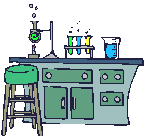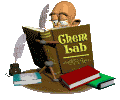|

Nature
& History of Chemistry
Matter & Change
Scientific Measurement
Problem~Solving in Chemistry
Atomic Structure
Chemical Names & Formulas
Chemical
Quantities
Stoichiometry
States of Matter
Gas Laws
Periodic Trends
Chemical Bonding
Water & Solutions
Acids & Bases
Metals & Non-Metals
Organic Chemistry
|
Course
Description
The
Journey into the inner workings of the MATTER:
(This
journey may change your view of the physical world,
your view of science, your view of learning, and your
view of how the physical world works!)
- This
is a project- and laboratory-based course where you
will be allowed to generate knowledge about chemistry
[a fancy term for the study of matter (aka anything
that has mass and takes up space)] with your peers.
- Your
teacher will be a guide for the journey, a facilitator,
an events planner, and occasionally a source of information.
-
Other sources of information will be the textbook,
charts and diagrams, videos, and many internet sources
selected by the guide and by yourselves.
- Always
remember, you are the learner here! You are the one
who needs to actively acquire knowledge.
- The
chemistry guide (aka teacher) will provide you some
of the ways and means of acquiring knowledge about
the physical world but you will also actively construct
and generate your own knowledge by interaction with
each other, written text (books, magazines, newspapers,
pamphlets, internet "stuff"), graphs and
data charts, numbers, drawings yours and those of
others), pictures and movies, sound, test tubes, liquids,
solids, gases, chemicals, fire, smelly stuff, flashy
stuff, computers, EACH OTHER....and the list goes
on......
- who
knows where the journey will lead (actually, the guide
does), but by the end of the journey you will be richer
in knowledge and experience.
|
|
 |
The
content: (Ah....now
it comes....)
- TERMINOLOGY
- used
to describe the living world and how it functions..
- .there
is a lot...it's like a whole new language, so be
prepared to memorize and share mnemonics with each
other
- Nature
& History of Chemistry
- Matter
& Change
- Scientific
Measurement
- Problem~Solving
in Chemistry
- Atomic
Structure
- Chemical
Names & Formulas
- Chemical
Quantities
- Stoichiometry
- States
of Matter
- Gas
Laws
- Periodic
Trends
- Chemical
Bonding
- Water
& Solutions
- Acids
& Bases
- Metals
& Non-Metals
- Organic
Chemistry
- This
doesn't seem so bad......you've seen some of this before
|
|

Nature
& History of Chemistry
Matter & Change
Scientific Measurement
Problem~Solving in Chemistry
Atomic Structure
Chemical Names & Formulas
Chemical Quantities
Stoichiometry
States of Matter
Gas Laws
Periodic Trends
Chemical Bonding
Water & Solutions
Acids & Bases
Metals & Non-Metals
Organic Chemistry
|
Goals
and Objectives:
- Conscientiously
become more scientifically literate in matters related
to the physical world as you develop an awareness of
the diversity and complexity of chemical processes and
interrelationships.
- Actively
ask, find, determine answers related to chemistry and
the physical world
- Carefully
describe, explain, and predict consequences based on
knowledge (prior and that to be acquired in this class)
of the the physical world by developing an understanding
of various scientific methods and how they are used
and how scientific hypotheses, laws, principles, and
theories are formulated and tested.
- Dilligently
use mathematical concepts to develop an understnding
of measuremtn accruacy and precision'
- Critically
analyze articles about chemistry in the popular press
- Accurately
organize, analyze, and communicate information about
the physical world
- Perceptively
discuss issues related to human interactions with the
physical world
- Dilligently
develop an understanding of chemical and physical processes
that occur within, affect, or are affected by living
organisms.
- Enthusiastically
develop an awareness of the history of science and the
men and women who have contributed to the advancement
of biological knowledge.
- Enjoy
the Journey
|
|

Nature
& History of Chemistry
Matter & Change
Scientific Measurement
Problem~Solving in Chemistry
Atomic
Structure
Chemical Names & Formulas
Chemical Quantities
Stoichiometry
States of Matter
Gas Laws
Periodic Trends
Chemical Bonding
Water & Solutions
Acids & Bases
Metals & Non-Metals
Organic Chemistry
|
Requirements
COME
TO CLASS PREPARED:
THIS
MEANS
- Read
the text assignments (see
homework chart)
- Prepare
and Study Vocabulary Lists conference
in Chapter Resources
- Prepare
Outlines for Each Chapter (use chapter
concept summaries as an aid
)
- TURN
IN ASSIGNMENTS ON TIME (This
means organize your time!)
- Bring
Text to Class
- Bring
a Pen or Pencil, Notebook, and Lab Notebook to class
- Bring
colored pens or pencils and a metric ruler to class
- TURN
IN ASSIGNMENTS ON TIME (did I mention
this?)
|
Tests

Tests
are on Thursdays
|
- 100
points each
- 6
per semester
- Multiple
choice, label diagrams, fill in the blanks.....
- Critical
Thinking Questions
- Vocabulary
Intensive
- Practice
Questions on Text
Website
- Graphing
and Data Analysis
- Short
paragraphs
- NO
DROPPED TESTS
|
Quizzes

|
- 5~25
points each
- Vocabulary-based,
math-based, or names and symbols of elements, ions,
and compounds
- Elements
tests every Monday during
1st quater (sample element
quiz)
- Ion
tests every Monday during
2nd quarter (sample ion quiz)
- MAY
BE UNANNOUNCED!!!!!
- COME
TO CLASS PREPARED!!!!
|
|
Projects
Hazardous
Materials
States of Matter
|
- 100
points each
- In
Class Preparation
- Group
and Individual
- Involve
Library and Internet Research
- Turned-in
via email
- PowerPoint
or Web Pages or Word with Graphics
- Presented
In Class and/or Viewed on the Web
- Reflection
Essay (individual
assessment = 25~50 pts)
|
|
Lab
Write-ups
See
Chemistry Lab Instructions for Details

The
Labs
|
- 25~100
points each
- Observations,
Data Gathering, Data Organizing, Graphing
- Microscopes,
Dissections
- Computer~Data
Generation
- Write-up
in Lab Notebook or Turn-in Via Email
|
Homework
Checks

|
- 5
points each = 20 pts per chapter
- Vocabulary
Definitions
- Chapter
Outlines (use chapter concept summary as template))
- Chapter
Questions (Homework Chart)
|
Semester
Final

|
- 20
percent of the semester grade
- Science
Comprehension:
- Read
and interpret information related to biology
- Science
Content:
- Similar
to chapter tests~~questions taken from these tests
- Data
Analysis:
- Organizing,
graphing, and interpreting data related to chemistry
- Critical
Thinking:
- Application
of chemistry content to decision~making and data
analysis
|
Frequently
Asked Questions

|
- Extra
Credit Reading Assignment for Christmas and Easter
- 10~20
points
- Reading
List and Instructions available prior to vacations
- Projects
are flexible in DESIGN, not in DUE DATE
- Turn
in all assignments on time.....
- have
I mentioned this?
- Quizzes
May Be Unannounced...
- Come
to Class Prepared ....
- have
I mentioned this?
- NO
DROPPED TESTS
|
|
Helpful
Hints

|
|
|
|